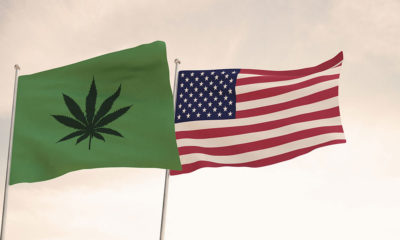
Legal
Hemp Advocates Challenge the DEA in Court Over Hemp Extract Ruling
On Feb. 15, lawyers presented oral arguments in the case, Hemp Industries Association v. DEA, which could have national repercussions regarding the legality of hemp-derived extracts.
The nation’s leading hemp industry nonprofit went to court with the Drug Enforcement Administration today, challenging a December 2016 move by the federal government that essentially served to put industrial hemp extracts under the same scrutiny as marijuana under the Controlled Substances Act.
“This is a most significant day for the industrial hemp industry,” Robert Hoban, one of the attorneys representing the Hemp Industries Association, told Cannabis Now. While the Ninth Circuit Court of Appeals did not issue a ruling today, they did hear the oral arguments presented by the Hemp Industries Association — and Hoban said he was hopeful that the court heard their appeal.
The Hemp Industries Assocation’s fight against the DEA started back in 2016, when the DEA created a new drug code number — which is what the DEA uses to track everything covered by The Controlled Substances Act of 1970 — for “marihuana extract.” According to the DEA, a marihuana extract now meant “extract containing one or more cannabinoids that has been derived from any plant of the genus Cannabis,” including hemp-derived CBD oil.
The folks over at the Hemp Industries Association went to court not long after the DEA released what it calls “the final rule” on cannabis extracts. The HIA argued that the final rule is essentially a scheduling action for substances such as industrial hemp, “and that the final rule contradicts specific Congressional legislation which exempts or legalizes certain parts and varieties of the cannabis plant, such as “industrial hemp.”
The HIA is referring to the Farm Act of 2014, which made it federally legal for states to set up pilot hemp programs.
The hemp industry has had support from across the government with fighting this final rule. In January, 28 members of Congress submitted an amicus brief to the court that called the move by the DEA “an abuse of DEA’s administrative rulemaking authority and otherwise not in accordance with the law.”
When the case was first filed, the HIA stated that they weren’t trying to get involved with the DEA’s conflict with Congress, but rather they were contesting the DEA’s “blatant disregard for the 2004 ruling made by the Ninth Circuit Court of Appeals, which permanently enjoined the DEA from regulating hemp fiber, stalk, sterilized seed and oil, which are specifically exempted from the definition of ‘marijuana’ in the federal Controlled Substances Act.”
“We will not stand idly by while the DEA flouts the will of Congress, violates the Ninth Circuit order, and harasses honest hemp producers trying to make a living with this in-demand crop,” Colleen Keahey, executive director of the Hemp Industries Association, said in a statement last year.
Hemp is legally set forth in the Farm Bill of 2014 as cannabis that contains less than 0.3 percent THC, meaning that it has no psychotropic affects.
“The DEA must stop treating hemp, hempseed and hempseed oil, which is a nutritious ingredient, as something illicit,” said Keahey. “We have to address the challenges that thwart the domestic industry’s progress and especially those that mislead state Departments of Agriculture and limit entry of legal hemp products into the marketplace.”
Since the case was originally filed last year, one of the nation’s leading cannabis industry attorneys has joined the plaintiff’s legal team.
“We are here because of executive administrative overreach,” Hoban argued to the Ninth Circuit Court of Appeals.
Hoban went on to highlight the four pillars of the HIA’s case. First, this final rule was the aforementioned overreach. Second, the plain and broad language of the final rule itself has room for interpretation. Third, five years elapsed between the initial rule that considered hemp separate from marijuana and final rule. And finally, there is intervening legislation that contradicts the DEA’s final rule.
“There was a seismic shift in U.S. cannabis policy with the enactment of the Farm Bill that seems to have created some confusion perhaps with the Drug Enforcement Administration,” Hoban told the court.
A member of the court stopped Hoban to ask if this came down to the DEA needing this code to fulfill international drug treaties. Hoban retorted the drug code definition in itself “goes far beyond the congressional authorization written to the DEA.”
Hoban said that the hemp industry is afraid because the DEA has been utilizing the final rule “week after week since its enactment to seize and cause criminal enforcement against lawful operators who require no DEA authorization.”
The court asked Hoban for an example besides the one he provided from North Dakota. Hoban replied, speaking of almost weekly examples of Customs and Border Patrol agents using the definition to declare legal products controlled substances.
After the proceedings, Hoban gave Cannabis Now his thoughts on the proceedings via email.
“It is now in the hands of the esteemed panel of Judges,” said Hoban. “The good news is that the DEA’s attorneys are aligned with our substantive legal position — this is a victory in and of itself.”
Patrick Goggin, the attorney who first filed the case last year on behalf of the hemp industry, told Cannabis Now, “We are feeling hopeful that the panel will find that the rule was an abuse of discretion by failing to distinguish industrial hemp extracts from marijuana extracts.”
TELL US, do you think that hemp-derived oils are different from marijuana extracts?






















